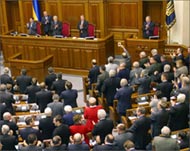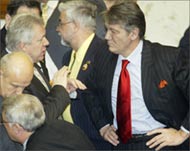Ukraine president’s powers cut
Ukraine’s parliament has passed a controversial amendment to weaken the presidency.

The move broke a tense stand-off between outgoing President Leonid Kuchma and the opposition, paving the way for a new presidential ballot on 26 December.
By an overwhelming vote of 402 to 21, deputies at the Upper Rada on Wednesday approved the amendment, which transfers many of the president’s powers to parliament. Kuchma has tried to pass the amendment for more than a year.
The 66-year-old leader, who made a rare appearance in the chamber to urge deputies to support the measure, applauded as the vote result appeared on an electronic board.
“Ukraine has gone through crisis several times and we always had the political will and understanding to make the right decisions,” he told deputies minutes before the vote.
Other changes
Lawmakers also passed changes to electoral law and voted in a new central elections commission, measures demanded by the opposition.
 |
|
The vote set the stage for a |
“This is an act of consolidation and reconciliation that proves Ukraine is united and indivisible,” parliament speaker Volodymyr Litvin said after the historic vote.
The vote broke a deadlock between Kuchma and opposition leader Viktor Yushchenko. It was expected to boost Yushchenko’s chances of winning the 26 December poll, which will once again pit him against Prime Minister Viktor Yanukovich, but significantly weaken his powers in the post in case of victory.
The amendment transfers important powers from the presidency to parliament, where opposition forces are now in a minority, and is due to enter into force by 1 January 2006, at the latest.
Reforms
Under the reforms, the president loses the power to appoint all top posts except for the prime minister, defence and foreign ministers. His candidates for these three posts need to be approved by legislators as well.
 |
|
Some Yushchenko (R) allies are |
Yushchenko had earlier sought to delay the changes coming into force until after the 2006 legislative elections, by which time the opposition forces had hoped to increase its representation in parliament.
But he compromised in exchange for parliament passing changes to electoral law intended at reducing the possibility of ballot fraud in the next election.
Some of his allies slammed him for agreeing to the changes. “This is a victory for Kuchma,” fumed Yulia Timoshenko, one of Yushchenko’s main allies. “This vote helps reduce the powers of a president Yushchenko. We could have won without it.”
Kuchma’s supporters, meanwhile, hailed the measure. “We have begun to talk in the language of national consolidation,” beamed Stepan Gavrish, a pro-government deputy.
Annulled
Yushchenko and Yanukovich had squared off during a 21 November runoff vote, which authorities said was won by Yanukovich, but was later annulled by the supreme court because of massive fraud.
|
“This vote helps reduce the powers of a president Yushchenko” Yulia Timoshenko, |
The opposition had mobilised hundreds of thousands of supporters in huge round-the-clock demonstrations in support of Yushchenko for weeks after the vote.
The 21 November election split this strategic nation of 48 million and sparked a cold war-like clash between the West and Russia, which accused the United States and the European Union of trying to install their ally in Kiev.